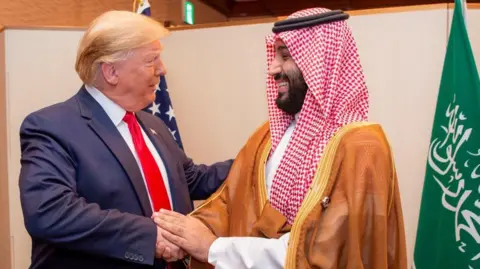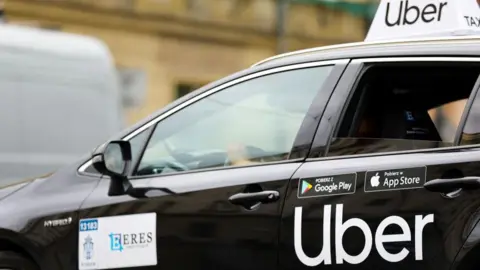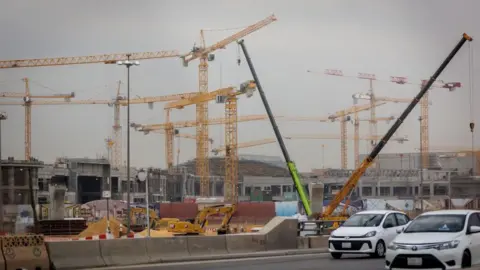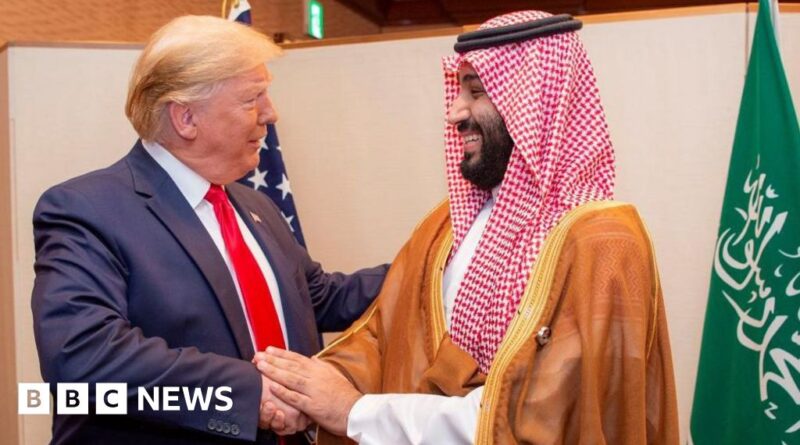Donald Trump heads to Saudi Arabia eyeing more Gulf investment in US
Business reporter
 Getty Images
Getty ImagesWith US President Donald Trump due to visit Gulf states this week, a key focus will be securing significant new investment for the US economy.
“President Trump wants the announcement [of more Gulf money for the US],” says economist Karen Young, a senior fellow at the Middle East Institute think tank.
“He wants to have a big poster in a meeting that describes where these investments might go. And some estimation of what they will do to the American economy in terms of job creation or his big push, of course, on domestic manufacturing.”
Trump is due to arrive in the Saudi capital, Riyadh, on Tuesday 13 May, to meet the country’s de facto leader Crown Prince Mohammed bin Salman.
Trump is then expected to attend a summit of Gulf leaders in the city on 14 May, before travelling to Qatar that same day, and then ending his three-day trip in the United Arab Emirates (UAE) on 15 May.
The economic importance of the region to Trump is highlighted by the fact that the visit to Saudi Arabia was due to be the first overseas trip of his second term in the White House. That was before the death of Pope Francis necessitated Trump attending his funeral in Rome towards the end of April.
Saudi Arabia was also the first country that Trump visited during his first term of office, going against the modern practise of US presidents to start with the UK, Canada or Mexico.
 Getty Images
Getty ImagesSecuring new investments in the US from Gulf states, and particularly from their state-backed sovereign wealth funds, will help Trump to signal back home that his “America First” agenda is delivering results.
The presidential visit is drawing top Wall Street and Silicon Valley leaders to Saudi Arabia. A Saudi-US investment forum on 13 May in Riyadh will feature CEOs from BlackRock, Palantir, Citigroup, IBM, Qualcomm, Alphabet, and Franklin Templeton.
The push comes amid economic headwinds, as President Trump’s new import tariffs have significantly disrupted global trade, confidence, and the US economy itself. US economic output fell in the first three months of this year, its first fall in three years.
Back in January, Prince Mohammed said that Saudi Arabia would invest $600bn (£450bn) in the US over the next years. However, Trump has already said that he’d like that to rise to $1tn, including purchases of more US military equipment.
According to Ali Shihabi – a Saudi commentator and author, with close ties to the Saudi government – a number of economic agreements will be signed during the trip.
“These deals will further integrate the Saudi and US economies together, joint ventures in the kingdom, in the United States, procurements of American weapons and goods,” says Mr Shihabi.
Saudi Arabia’s sovereign wealth fund, the Public Investment fund (PIF), which controls assets worth $925bn, already has numerous investments in the US. These include Uber, gaming firm Electronic Arts, and electric car firm Lucid.
Meanwhile, the UAE has already committed to investing $1.4tn in the US over the next 10 years, in sectors such as AI, semiconductors, energy and manufacturing. This was announced by the White House in March after the UAE’s national security advisor, Sheikh Tahnoon bin Zayed Al Nahyan, met President Trump in Washington.
Yet Ms Young from the Middle East Institute says that the scale of these investments is not realistic in the short term. She instead says that they are long-term strategic moves, and that the figures should be taken “with a little bit of a grain of salt”.
Regarding specific deals that could be announced during Trump’s visit, it is widely reported that Saudi Arabia will agree to buy more than $100bn of US arms and other military items.
These are said to include missiles, radar systems and transport aircraft.
The US has been a longstanding arms supplier to Saudi Arabia, but in 2021 the then Biden administration stopped selling Riyadh offensive weapons, citing concerns about the country’s role in the war in neighbouring Yemen.
The 2018 killing of Saudi journalist Jamal Khashoggi was also widely reported to be a factor. A US report said that Prince Mohammed had approved the murder.
The Biden White House resumed the sale of these weapons last year. While it cited that the Saudis had stopped bombing Yemen, some commentators said that the US was seeking Saudi assistance to help end the conflict in Gaza and aid its future reconstruction.
 Getty Images
Getty ImagesMr Shihabi says Saudi Arabia will be seeking assurances from the White House that the US will implement a “more efficient procurement system”, enabling the Gulf state to access ammunition and military equipment far more quickly and easily.
“The Trump administration is initiating procedures to facilitate those deals. So, it’s expected that this process will improve immediately,” he adds.
Artificial intelligence is the other topic that will dominate the agenda during Mr Trump’s visit. Talks are expected to centre on attracting greater Gulf investment into US tech firms, and boosting the region’s access to cutting-edge American semiconductors.
The UAE and Saudi Arabia have been investing billions of dollars into tech and AI sectors as try to diversify their economies away from oil.
The Emiratis, in particular, are keen to establish themselves as a global AI hub.
Last week, the Trump administration scrapped the Biden-era chip regulations that placed restrictions on exports of advanced US chips to more than 120 countries including the Gulf states.
The White House is expected to draft new rules that would potentially involve direct negotiations with countries like the UAE.
“For the UAE, this is absolutely essential,” says Ms Young. “They are aggressively building out their AI capacity. So, for them getting access to US technology is imperative to be the best.”
While much attention will be on Trump courting Gulf capital for the US, Saudi Arabia is equally focused on drawing American investment into its ambitious Vision 2030 program.
Led by giant construction projects, such as the building of a linear city called The Line, Vision 2030 is central to the Saudi government’s continuing efforts to diversify the country’s economy away from oil.
It also involves pouring resources into entertainment, tourism, mining and sports.
However, foreign direct investment into Saudi Arabia declined for a third straight year in 2024, reflecting persistent challenges in attracting overseas capital.
The fall in global oil prices since the start of the year has further strained Riyadh’s finances, increasing pressure to either raise debt or cut spending to sustain its development goals.
Oil prices tumbled to a four-year low amid growing concerns that a trade war could dampen global economic growth.
The decline was further fuelled by the group of oil producing nations, Opec+, announcing plans to increase output.
Saudi Arabia is part of that group, and some commentators said that the rise was in part a desire to please Trump, who has called for lower oil prices.
Other analysts said the reason was more that Opec+ remains confident that the global economy is growing.
The US-Saudi Business Council, is an organisation that aims to boost trade ties between the two countries.
It is hoping that Trump’s visit will push American businesses to explore more opportunities in Saudi Arabia, especially in sectors like AI, healthcare and education.
“The Saudi government is looking heavily to invest in these sectors. There is a very big appetite for Saudi companies to collaborate with American companies,” Huthaim Al Jalal, who heads the Riyadh office for the organisation, tells the BBC.
Saudi officials are said to be confident that some deals in these sectors will be secured during Trump’s visit.
For Saudi Arabia, Trump’s visit is about strengthening ties with their longest-standing Western ally – a relationship that grew strained during the Biden years. For President Trump, it is about landing investment deals that can be framed as a win for his economic agenda.
“President Trump is looking for a headline of big investments in America, and he will get that from this trip,” adds Mr Shihabi.


